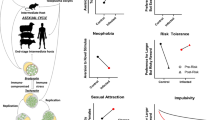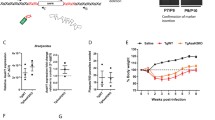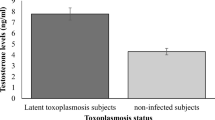Abstract
Many parasites have evolved adaptive mechanisms for manipulation of host phenotypes, including behavior, to increase their chances of transmission from infected to noninfected hosts (Holmes J, Bethel WM. Modification of intermidiate host behaviour by parasites. In: Canning EU, Wright CA (eds) Behavioural aspects of parasite transmission. Academic Press, New York, p 123–149, 1972). Very conspicuous behavioral changes are induced by parasites that are transmitted from intermediate to definitive host by predation because induced behavioral patterns increase biological fitness of the manipulating parasite but decrease fitness of the carrier – the infected animal. An already classical model for studying manipulative activity of parasites is the heteroxenous coccidian Toxoplasma gondii, whose life cycle includes transmission from intermediate host (any warm blooded animal) to definitive host (any feline species) by predation. Toxoplasma is known to modify not only the behavior of its intermediate animal hosts but also the behavior and personality of infected humans. The mechanisms most probably responsible for the observed behavioral changes are increase of dopamine, increase of testosterone in males and hypomethylation of certain regulatory elements of key genes in amygdala of infected hosts.
Access this chapter
Tax calculation will be finalised at checkout
Purchases are for personal use only
Similar content being viewed by others
References
Abdoli A (2013) Toxoplasma gondii and neuropsychiatric diseases: strain hypothesis. Neurol Sci 34(9):1697–1698. doi:10.1007/s10072-012-1264-x
Berdoy M, Webster JP, Macdonald DW (1995) Parasite-altered behaviour: is the effect of Toxoplasma gondii on Rattus norvegicus specific? Parasitology 111:403–409
Berdoy M, Webster JP, Macdonald DW (2000) Fatal attraction in rats infected with Toxoplasma gondii. Proc R Soc Biol Sci Ser B 267(1452):1591–1594
Beste C, Getzmann S, Gajewski PD, Golka K, Falkenstein M (2014) Latent Toxoplasma gondii infection leads to deficits in goal-directed behavior in healthy elderly. Neurobiol Aging 35(5):1037–1044. doi:10.1016/j.neurobiolaging.2013.11.012
Ferreira EC, Marchioro AA, Guedes TA, Mota D, Guilherme ALF, de Araujo SM (2013) Association between seropositivity for Toxoplasma gondii, scholastic development of children and risk factors for T. gondii infection. Trans R Soc Trop Med Hyg 107(6):390–396. doi:10.1093/trstmh/trt026
Flegr J (2010) Influence of latent toxoplasmosis on the phenotype of intermediate hosts. Folia Parasitol 57:81–87
Flegr J (2013a) How and why Toxoplasma makes us crazy. Trends Parasitol 29(4):156–163
Flegr J (2013b) Influence of latent Toxoplasma infection on human personality, physiology and morphology: pros and cons of the Toxoplasma-human model in studying the manipulation hypothesis. J Exp Biol 216(1):127–133. doi:10.1242/jeb.073635
Flegr J, Hrdý I (1994) Influence of chronic toxoplasmosis on some human personality factors. Folia Parasitol 41:122–126
Flegr J, Havlíček J, Kodym P, Malý M, Šmahel Z (2002) Increased risk of traffic accidents in subjects with latent toxoplasmosis: a retrospective case-control study. BMC Infect Dis 2:art-11
Flegr J, Hrušková M, Hodný Z, Novotná M, Hanušová J (2005) Body height, body mass index, waist-hip ratio, fluctuating asymmetry and second to fourth digit ratio in subjects with latent toxoplasmosis. Parasitology 130:621–628
Flegr J, Lindová J, Kodym P (2008) Sex-dependent toxoplasmosis-associated differences in testosterone concentration in humans. Parasitology 135:427–431
Flegr J, Klose J, Novotná M, Berenreitterová M, Havlíček J (2009) Increased incidence of traffic accidents in Toxoplasma-infected military drivers and protective effect RhD molecule revealed by a large-scale prospective cohort study. BMC Infect Dis 9:art. 72
Flegr J, Lenochová P, Hodný Z, Vondrová M (2011) Fatal attraction phenomenon in humans: cat odour attractiveness increased for Toxoplasma-infected men while decreased for infected women. PLoS Neglect Trop D 5(11), e1389. doi:10.1371/journal.pntd.0001389
Flegr J, Geryk J, Volny J, Klose J, Cernochova D (2012a) Rhesus factor modulation of effects of smoking and age on psychomotor performance, intelligence, personality profile, and health in Czech soldiers. PLoS One 7(11), e49478. doi:10.1371/journal.pone.0049478
Flegr J, Guenter W, Bielinski M (2012b) Toxoplasma gondii infection affects cognitive function – corrigendum. Folia Parasitol 59:253–254
Flegr J, Preiss M, Klose J (2013) Toxoplasmosis-associated difference in intelligence and personality in men depends on their Rhesus blood group but not ABO blood group. PLoS One 8(4):e61272. doi:10.1371/journal.pone.0061272
Flegr J, Klapilová K, Kaňková Š (2014a) Toxoplasmosis can be a sexually transmitted infection with serious clinical consequences. Not all routes of infection are created equal. Med Hypotheses 83:286–289
Flegr J, Prandota J, Sovickova M, Israili ZH (2014b) Toxoplasmosis – a global threat. Correlation of latent toxoplasmosis with specific disease burden in a set of 88 countries. PLoS One 9(3):e90203. doi:10.1371/journal.pone.0090203
Gaskell EA, Smith JE, Pinney JW, Westhead DR, McConkey GA (2009) A unique dual activity amino acid hydroxylase in Toxoplasma gondii. PLoS One 4, e4801
Havlíček J, Gašová Z, Smith AP, Zvára K, Flegr J (2001) Decrease of psychomotor performance in subjects with latent ‘asymptomatic’ toxoplasmosis. Parasitology 122:515–520
Hay J, Hutchison WM, Aitken PP, Graham DI (1983) The effect of congenital and adult-acquired Toxoplasma infections on activity and responsiveness to novel stimulation in mice. Ann Trop Med Parasitol 77:483–495
Hay J, Aitken PP, Graham DI (1984a) Toxoplasma infection and response to novelty in mice. Z Parasitenkd 70:575–588
Hay J, Aitken PP, Hair DM, Hutchison WM, Graham DI (1984b) The effect of congenital Toxoplasma infection on mouse activity and relative preference for exposed areas over a series of trials. Ann Trop Med Parasitol 78:611–618
Hay J, Aitken PP, Arnott MA (1985) The influence of Toxoplasma infection on the spontaneous running activity of mice. Z Parasitenkd 71:459–462
Holmes J, Bethel WM (1972) Modification of intermidiate host behaviour by parasites. In: Canning EU, Wright CA (eds) Behavioural aspects of parasite transmission. Academic, New York, pp 123–149
Holub D et al (2013) Differences in onset of disease and severity of psychopathology between toxoplasmosis-related and toxoplasmosis-unrelated schizophrenia. Acta Psychiatr Scand 127:227–238. doi:10.1111/acps.12031
Horacek J et al (2012) Latent toxoplasmosis reduces gray matter density in schizophrenia but not in controls: Voxel-based-morphometry (VBM) study. World J Biol Psychiatry 13(7):501–509. doi:10.3109/15622975.2011.573809
Hrdá Š, Votýpka J, Kodym P, Flegr J (2000) Transient nature of Toxoplasma gondii-induced behavioral changes in mice. J Parasitol 86(4):657–663
Hutchison WM, Aitken PP, Wells BW (1980a) Chronic Toxoplasma infections and motor performance in the mouse. Ann Trop Med Parasitol 74:507–510
Hutchison WM, Bradley M, Cheyne WM, Wells BWP, Hay J (1980b) Behavioural abnormalities in Toxoplasma -infected mice. Ann Trop Med Parasitol 74:337–345
Kaňková Š, Kodym P, Frynta D, Vavřinová R, Kuběna A, Flegr J (2007a) Influence of latent toxoplasmosis on the secondary sex ratio in mice. Parasitology 134:1709–1717
Kaňková Š, Šulc J, Nouzová K, Fajfrlik K, Frynta D, Flegr J (2007b) Women infected with parasite Toxoplasma have more sons. Naturwissenschaften 94:122–127
Kannan G, Moldovan K, Xiao JC, Yolken RH, Jones-Brando L, Pletnikov MV (2010) Toxoplasma gondii strain-dependent effects on mouse behaviour. Folia Parasitol 57:151–155
Kocazeybek B et al (2009) Higher prevalence of toxoplasmosis in victims of traffic accidents suggest increased risk of traffic accident in Toxoplasma-infected inhabitants of Istanbul and its suburbs. Forensic Sci Int 187:103–108
Lafferty KD (2006) Can the common brain parasite, Toxoplasma gondii, influence human culture? Proc R Soc Biol Sci Ser B 273:2749–2755
Lester D (2010) Predicting European suicide rates with physiological indices. Psychol Rep 107:713–714
Lim A, Kumar V, Hari Dass SA, Vyas A (2013) Toxoplasma gondii infection enhances testicular steroidogenesis in rats. Mol Ecol 22(1):102–110. doi:10.1111/mec.12042
Lindová J et al (2006) Gender differences in behavioural changes induced by latent toxoplasmosis. Int J Parasitol 36:1485–1492
Lindová J et al (2010) Pattern of money allocation in experimental games supports the stress hypothesis of gender differences in Toxoplasma gondii-induced behavioural changes. Folia Parasitol 57:136–142
Nikam SS, Awasthi AK (2008) Evolution of schizophrenia drugs: a focus on dopaminergic systems. Curr Opin Invest Drugs 9:37–46
Novotná M et al (2008) Toxoplasma and reaction time: role of toxoplasmosis in the origin, preservation and geographical distribution of Rh blood group polymorphism. Parasitology 135:1253–1261
Pearce BD et al (2013) Toxoplasma gondii exposure affects neural processing speed as measured by acoustic startle latency in schizophrenia and controls. Schizophr Res 150:258–261
Pearce BD, Kruszon-Moran D, Jones JL (2014) The association of Toxoplasma gondii infection with neurocognitive deficits in a population-based analysis. Soc Psychiatry Psychiatr Epidemiol 49(6):1001–1010. doi:10.1007/s00127-014-0820-5
Piekarski G, Zippelius HM, Witting PA (1978) Auswirkungen einer latenten Toxoplasma -Infektion auf das Lernvermogen von weissen Laboratoriumsratten and Mausen. Z Parasitenkd 57:1–15
Prandovszky E, Gaskell E, Martin H, Dubey JP, Webster JP, McConkey GA (2011) The neurotropic parasite Toxoplasma gondii increases dopamine metabolism. PLoS One 6(9), e23866
Priplatova L, Sebankova B, Flegr J (2014) Contrasting effect of prepulse signals on performance of Toxoplasma-infected and Toxoplasma-free subjects in an acoustic reaction times test. PLoS One 9(11):e112771. doi:10.1371/journal.pone.0112771
Skallová A, Kodym P, Frynta D, Flegr J (2006) The role of dopamine in Toxoplasma-induced behavioural alterations in mice: an ethological and ethopharmacological study. Parasitology 133:525–535
Stock AK, Heintschel von Heinegg E, Kohling HL, Beste C (2013) Latent Toxoplasma gondii infection leads to improved action control. Brain Behav Immun. doi:10.1016/j.bbi.2013.11.004
Vyas A, Kim SK, Giacomini N, Boothroyd JC, Sapolsky RM (2007) Behavioral changes induced by Toxoplasma infection of rodents are highly specific to aversion of cat odors. Proc Natl Acad Sci U S A 104:6442–6447
Wang HL, Wang GH, Li QY, Shu C, Jiang MS, Guo Y (2006) Prevalence of Toxoplasma infection in first-episode schizophrenia and comparison between Toxoplasma-seropositive and Toxoplasma-seronegative schizophrenia. Acta Psychiatr Scand 114:40–48
Webster JP (1994) The effect of Toxoplasma gondii and other parasites on activity levels in wild and hybrid Rattus norvegicus. Parasitology 109:583–589
Webster JP, Brunton CFA, Macdonald DW (1994) Effect of Toxoplasma gondii upon neophobic behaviour in wild brown rats, Rattus norvegicus. Parasitology 109:37–43
Willner P (1997) The dopamine hypothesis of schizophrenia: current status, future prospects. Int Clin Psychopharmacol 12(6):297–308
Witting PA (1979) Learning capacity and memory of normal and Toxoplasma -infected laboratory rats and mice. Z Parasitenkd 61:29–51
Xiao J et al (2012) Sex-specific changes in gene expression and behavior induced by chronic Toxoplasma infection in mice. Neuroscience 206:39–48. doi:10.1016/j.neuroscience.2011.12.051
Xiao JC, Li Y, Jones-Brando L, Yolken RH (2013) Abnormalities of neurotransmitter and neuropeptide systems in human neuroepithelioma cells infected by three Toxoplasma strains. J Neural Transm 120(12):1631–1639. doi:10.1007/s00702-013-1064-3
Yereli K, Balcioglu IC, Ozbilgin A (2006) Is Toxoplasma gondii a potential risk for traffic accidents in Turkey? Forensic Sci Int 163:34–37
Author information
Authors and Affiliations
Corresponding author
Editor information
Editors and Affiliations
Rights and permissions
Copyright information
© 2015 Springer International Publishing Switzerland
About this chapter
Cite this chapter
Flegr, J. (2015). Host Manipulation by Toxoplasma gondii . In: Mehlhorn, H. (eds) Host Manipulations by Parasites and Viruses. Parasitology Research Monographs, vol 7. Springer, Cham. https://doi.org/10.1007/978-3-319-22936-2_6
Download citation
DOI: https://doi.org/10.1007/978-3-319-22936-2_6
Publisher Name: Springer, Cham
Print ISBN: 978-3-319-22935-5
Online ISBN: 978-3-319-22936-2
eBook Packages: Biomedical and Life SciencesBiomedical and Life Sciences (R0)




